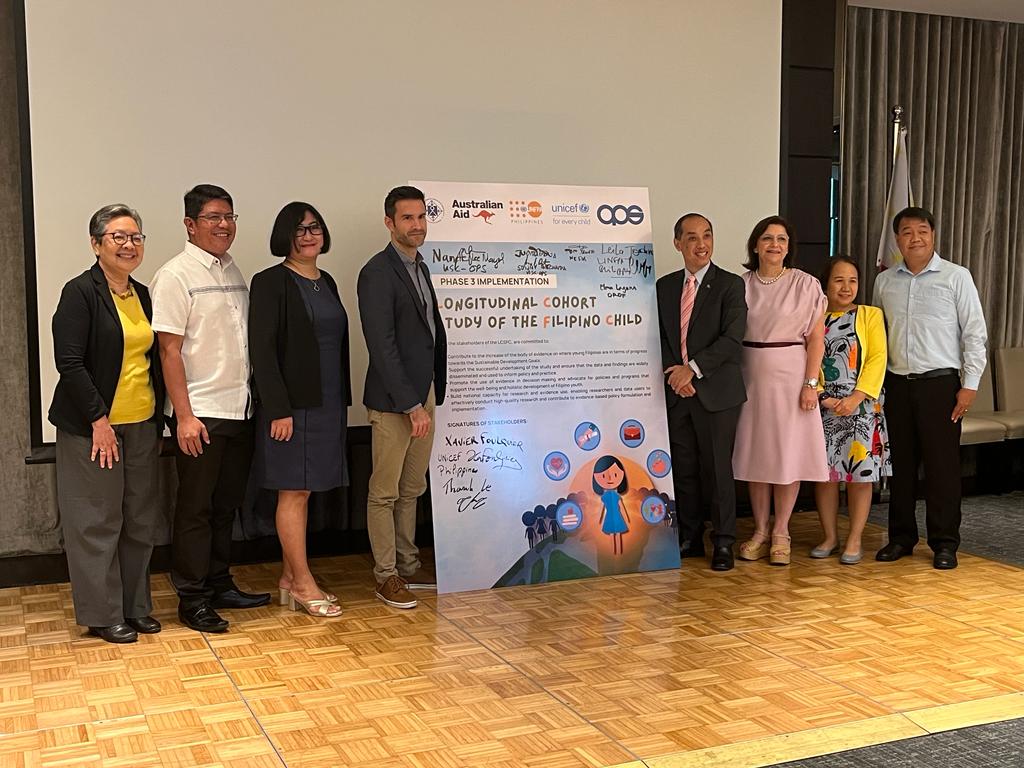Gender-based challenges falter Filipino girls’ potentials, study shows

Longitudinal Cohort Study for the Filipino Child stakeholders during the signing ceremony of the board of commitment to the study in New World Makati Hotel on Thursday, October 5, 2023
MANILA, Philippines — Results of a cohort study following the growth of Filipino children revealed that girls fare better than boys during early stages but seem to eventually lose this advantage due to gender-based challenges.
Dr. Nanette Lee-Mayol, the University of San Carlos – Office of Population Studies Foundation (USC-OPS), Inc. director, discussed these results on Thursday during the United Nations Population Fund (UNFPA)’s launch of the third phase of the Longitudinal Cohort Study for the Filipino Child (LCSFC).
The launch was in partnership with the USC-OPS, the Australian Government, the United Nations Children’s Funds, and the National Economic and Development Authority.
LCSFC, according to UNFPA, is an ongoing 15-year nationwide study that started in 2016 and is being implemented by a research consortium led by USC-OPS.
It follows a group of 5,000 10-year-old Filipino boys and girls whose transitions from childhood to adolescence, then adulthood, or until they are 24 years of age are being tracked.
Based on the study’s results, girls in earlier stages were observed to do better than boys.
In terms of unhealthy and risky behaviors, at ages 13 to 14, only 2.5 percent of girls, compared to 7.7 percent of boys, ever tried smoking. For those who had an alcohol intake, only 12.8 percent of the girls did, while 21.3 percent of the boys did.
In terms of health, the study shows that adolescent girls are less likely to be stunted, underweight, or overweight.
In academics, girls were also seen to be more likely to stay on track in education compared to boys.
However, the study suggests that these relative advantages of girls seem to falter as they get older.
According to the study, girls face unique challenges that may undermine their early advantages and could significantly impact their future.
UNFPA said that 2.6 percent of the girls covered by the study had early childbearing.
Forum for Family Planning and Development Vice President Dr. Juan Antonio Perez III pointed out that the data, when compared to the 10,000 sampling the Philippine Statistics Authority uses, is higher for early adolescent birth rate.
Regarding early union or cohabitation, the study says three percent of girls are already cohabiting, compared to one percent of boys.
Unfair gender norms are as well seen as possible factors in the weakening potential of girls.
Data from the study shows that girls spend more time than boys doing household chores. With this, Dr. Mayol said that boys usually have more time for study, leisure, and other activities.
Dr. Mayol noted that existing gender norms prepare boys more for economic activities as boys at an early age have already experienced working, while girls take care of household production.
With these, she mentioned that boys will be preferred economically in the future.
The cohort study, according to UNFPA, is now approaching its seventh year and is already in its third phase. Based on its timeline following the Sustainable Development Goals, it will be completed by the year 2030.
It was said the study aims to help children reach their full potential.
“As we already know, as reported by other national studies, that women are less likely to be able to participate economically and in decision-making during adulthood. Our cohort study aims to learn why this happens, and what factors contribute to girls losing their edge as they reach adulthood,” Dr. Mayol stated.
“So we are hopeful, and we hope that the study will generate insights that will help stakeholders provide solutions and enable women to realize their full potential,” she continued.
“What the world will look like in 15 years depends on our power to unlock their potential today,” an audio-visual presentation pertaining to Filipino children presented in the launch also said.
UNFPA Philippines Country Representative Dr. Leila Saiji Joudane, in her closing remarks, further affirmed their goal to support gender equality to eradicate gender discrimination.
The launch of the study’s third phase was held to celebrate the International Day of the Girl Child, an international observance day declared by the United Nations (UN) to recognize girls’ challenges.
The UNFPA, according to its website, is the UN’s sexual and reproductive health agency, whose mission is to have a world where “every pregnancy is wanted, every childbirth is safe and every young person’s potential is fulfilled.”
RELATED STORIES
Int’l organizations team up vs teenage pregnancies
Senate to probe lack of activity, ambition among young Filipinos
The unfinished business of gender equality